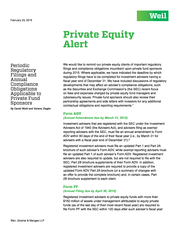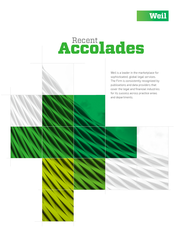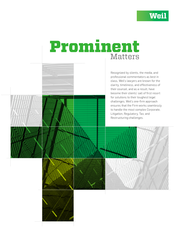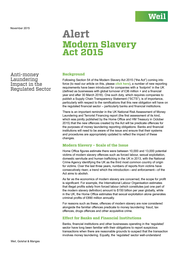Environmental Due Diligence and Risk Allocation in M&A Transactions - December 08, 2015
Weil, Gotshal & Manges
Description
Practical guidance at Lexis Practice Advisor®
For a discussion of environmental due diligence, see Environmental Due Diligence in M&A Transactions. For a discussion of
how to deal with environmental risks when drafting the acquisition agreement, see Allocating Environmental Risks in the
Transaction Agreement.
A. Permits and Authorizations
Depending on the nature of the business or assets, a seller and buyer may need to cooperate to ensure that required
permits and authorizations are in place before the transaction can close. For example, in an asset sale, the parties may
need to transfer certain environmental permits relating to air emissions, wastewater or stormwater discharges, or
hazardous waste storage.
Transferring an environmental permit can be a time-consuming undertaking, so if due diligence identifies the need to transfer permits, the parties would be wise to engage with the permitting entity shortly after signing, to facilitate a timely closing. In a stock sale, if the permitted entity is being transferred from the seller to the buyer, the permit should transfer without the need to seek a formal transfer. That being said, certain states require the parties to notify the permitting agency if there is a change in control of the permitted entity, and the permit may need to be amended to make administrative changes, e.g., the name of the plant manager or the mailing address for notices. B.
Financial Assurance Obligations In addition to permit transfer considerations, certain transactions may involve the transfer of financial assurance obligations. In certain circumstances, an environmental regulator may require a business to provide financial assurance, particularly if the business is conducting a significant environmental cleanup, or if the business has significant reclamation obligations (e.g., a mining company). Where a business with financial assurance obligations is being sold as part of a transaction, there may be a need to arrange for alternate financial assurance before the transaction can close.
Because financial assurance obligations differ from state to state, and the methods for meeting those obligations can vary substantially, parties to a transaction involving the transfer of environmental financial assurance obligations will need to understand not only the nature of the obligation, but what options the buyer has to meet those obligations. For example, a large, publicly traded company may be able to meet its financial assurance obligation simply by demonstrating to the agency that it has sufficient assets to meet whatever environmental liabilities arise; however, the buyer may not be able to make such a demonstration and may be required to establish a trust and fully fund the obligation, which could impact the economics of the deal. C. Ongoing Environmental Obligations After the due diligence is complete, the agreement is signed, and the permits and financial assurance obligations are transferred, the transaction can close. Even though the transaction may be complete, the parties' environmental obligations continue.
The buyer is now responsible for maintaining compliance with environmental requirements. The seller may have continuing obligations to indemnity for, or even conduct, environmental remediation, depending on how such obligations are allocated in the sale agreement. The parties may also have specific obligations with respect to any third party claims that arise after the closing.
Additionally, in most transaction agreements, there are post-closing covenants that require the parties to cooperate and share documents to respond to any government inquiries, at least for a certain period of time. While it may seem that environmental obligations are never complete (and, indeed, that may be accurate), if a buyer can perform – and the seller will facilitate – a robust environmental due diligence assessment, it increases the likelihood that both parties will remain satisfied with the deal. Annemargaret Connolly is a partner and head of the Environmental practice at Weil, Gotshal & Manges LLP. Thomas D. Goslin is counsel at Weil, Gotshal & Manges LLP. This excerpt from Lexis Practice Advisor®, a comprehensive practical guidance resource providing insight from leading practitioners, is reproduced with the permission of LexisNexis.
Lexis Practice Advisor includes coverage of the topics critical to attorneys who handle transactional matters. For more information or to sign up for a free trial visit www.lexisnexis.com/practice-advisor. Reproduction of this material, in any form, is specifically prohibited without written consent from LexisNexis. Learn more at: lexisnexis.com/practice-advisor LexisNexis, Lexis Practice Advisor and the Knowledge Burst logo are registered trademarks of Reed Elsevier Properties Inc., used under license. © 2015 LexisNexis.
All rights reserved. .
Transferring an environmental permit can be a time-consuming undertaking, so if due diligence identifies the need to transfer permits, the parties would be wise to engage with the permitting entity shortly after signing, to facilitate a timely closing. In a stock sale, if the permitted entity is being transferred from the seller to the buyer, the permit should transfer without the need to seek a formal transfer. That being said, certain states require the parties to notify the permitting agency if there is a change in control of the permitted entity, and the permit may need to be amended to make administrative changes, e.g., the name of the plant manager or the mailing address for notices. B.
Financial Assurance Obligations In addition to permit transfer considerations, certain transactions may involve the transfer of financial assurance obligations. In certain circumstances, an environmental regulator may require a business to provide financial assurance, particularly if the business is conducting a significant environmental cleanup, or if the business has significant reclamation obligations (e.g., a mining company). Where a business with financial assurance obligations is being sold as part of a transaction, there may be a need to arrange for alternate financial assurance before the transaction can close.
Because financial assurance obligations differ from state to state, and the methods for meeting those obligations can vary substantially, parties to a transaction involving the transfer of environmental financial assurance obligations will need to understand not only the nature of the obligation, but what options the buyer has to meet those obligations. For example, a large, publicly traded company may be able to meet its financial assurance obligation simply by demonstrating to the agency that it has sufficient assets to meet whatever environmental liabilities arise; however, the buyer may not be able to make such a demonstration and may be required to establish a trust and fully fund the obligation, which could impact the economics of the deal. C. Ongoing Environmental Obligations After the due diligence is complete, the agreement is signed, and the permits and financial assurance obligations are transferred, the transaction can close. Even though the transaction may be complete, the parties' environmental obligations continue.
The buyer is now responsible for maintaining compliance with environmental requirements. The seller may have continuing obligations to indemnity for, or even conduct, environmental remediation, depending on how such obligations are allocated in the sale agreement. The parties may also have specific obligations with respect to any third party claims that arise after the closing.
Additionally, in most transaction agreements, there are post-closing covenants that require the parties to cooperate and share documents to respond to any government inquiries, at least for a certain period of time. While it may seem that environmental obligations are never complete (and, indeed, that may be accurate), if a buyer can perform – and the seller will facilitate – a robust environmental due diligence assessment, it increases the likelihood that both parties will remain satisfied with the deal. Annemargaret Connolly is a partner and head of the Environmental practice at Weil, Gotshal & Manges LLP. Thomas D. Goslin is counsel at Weil, Gotshal & Manges LLP. This excerpt from Lexis Practice Advisor®, a comprehensive practical guidance resource providing insight from leading practitioners, is reproduced with the permission of LexisNexis.
Lexis Practice Advisor includes coverage of the topics critical to attorneys who handle transactional matters. For more information or to sign up for a free trial visit www.lexisnexis.com/practice-advisor. Reproduction of this material, in any form, is specifically prohibited without written consent from LexisNexis. Learn more at: lexisnexis.com/practice-advisor LexisNexis, Lexis Practice Advisor and the Knowledge Burst logo are registered trademarks of Reed Elsevier Properties Inc., used under license. © 2015 LexisNexis.
All rights reserved. .









